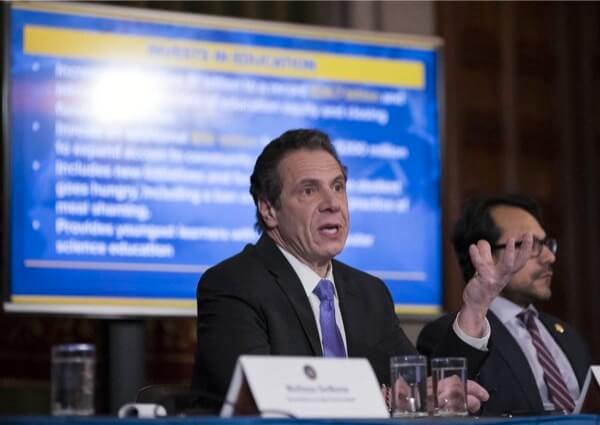By Mark Hallum
Gov. Andrew Cuomo announced details of the fiscal year 2019 state budget with a message that tightened oversight of City Hall and stood defiant against the administration in Washington.
With increased sway over public schools under mayoral control, increased funding for NYCHA housing, plans for the eventual closure of Rikers Island and a middle- class tax cut designed to shield New Yorkers from the effects of the federal tax plan, the $168.3 billion state budget placed a heavy emphasis on improvements in the city.
“This budget is a bold blueprint for progressive action that builds on seven years of success and helps New York continue to lead amid a concerted and sustained assault from Washington on our values and principles,” Cuomo said.
Schools will see a 3.9 percent increase in funding over last year with $26.7 billion for the 2018-2019 year, which will amount to a 36 percent increase in education funding from 2012 levels when Cuomo took office.
The bill also requires the school districts to be transparent about where they allocate funds and invests $25 million in pre-K and after-school programs.
The state answered the calls of Queens elected officials to cut through bureaucracy to implement improvements to NYCHA facilities with $250 million after Astoria Houses received backup generators in February, which had been in the pipeline following Superstorm Sandy.
Cuomo said he would issue an executive order for City Council to appoint an independent monitor to work in collaboration with the state and residents in NYCHA housing, which sparked controversy regarding the long-running feud between the governor and the mayor.
“New York will also become the first state to implement new measures to shield families from the devastating federal tax law’s elimination of full state and local deductibility — an economic arrow aimed at the heart of this state’s economy,” Cuomo said. “This budget also delivers for the most vulnerable among us, including the NYCHA tenants who have had to live with mold, lead and no heat and were placed at risk by a failed bureaucracy, and those who have had to endure the injustice that is Rikers Island.”
Although the budget includes funds to expedite the construction of new jails leading to the closure of Rikers, former judge and Chairman of the Independent Commission on New York City Criminal Justice Jonathan Lippman claimed the effort just is not enough without additional changes to criminal justice laws in place.
“Closing Rikers and improving our criminal justice system is a moral imperative that requires courage and persistence from our elected leaders,” Lippman said. “Before the end of session, I hope that our state legislators take action to reform our broken bail system, make discovery fairer for defendants, and improve our speedy trial laws. The sooner Albany passes legislation that improves our criminal justice system, the sooner we can close the accelerator of human misery that is Rikers Island and bring justice to thousands of New Yorkers who suffer from our unfair system every day.”
The governor included a $4.2 billion middle-class tax cut to 6 million residents across the state, which should save an annual $700 per household in Phase I of the plan and will eventually save $4.2 billion for residents by 2025.
The Citizens Budget Commission said it was a good start, with more precautions needed further down the road.
“State lawmakers deserve credit for making changes to the state’s tax code in response to the Tax Cuts and Jobs Act,” a commission statement said. “Creation of an Employer Compensation Expense Tax, state and local funds for charitable contributions, and other technical fixes are changes needed to blunt the impact of the federal tax law, particularly for taxpayers that will be adversely affected by the cap on state and local deductions (SALT cap). The state’s decoupling from the federal tax code will also eliminate a $1 billion unplanned tax increase, but may present new challenges in administration.”
Not mentioned in the budget was a means to launch the FixNYC’s congestion pricing proposal, an $11 fee on cars entering Manhattan below 60th Street, to create a reliable, long-term funding stream for the MTA.
Instead, Cuomo laid out a plan to charge for-hire vehicles $2.75 to enter Manhattan below 96th Street and the dedication of funds from the Payroll Mobility Tax to the MTA to grease the wheels on the Subway Action Plan, a short-term strategy to curb the widespread delays and meltdowns on the system.
As part of the budget, the city will be required to pay for half of MTA Chair Joe Lhota’s Subway Action Plan, a $836 million short-term initiative to stabilize the city transit infrastructure while a more long-term solution can be settled upon.
Reach reporter Mark Hallum by e-mail at mhall


































